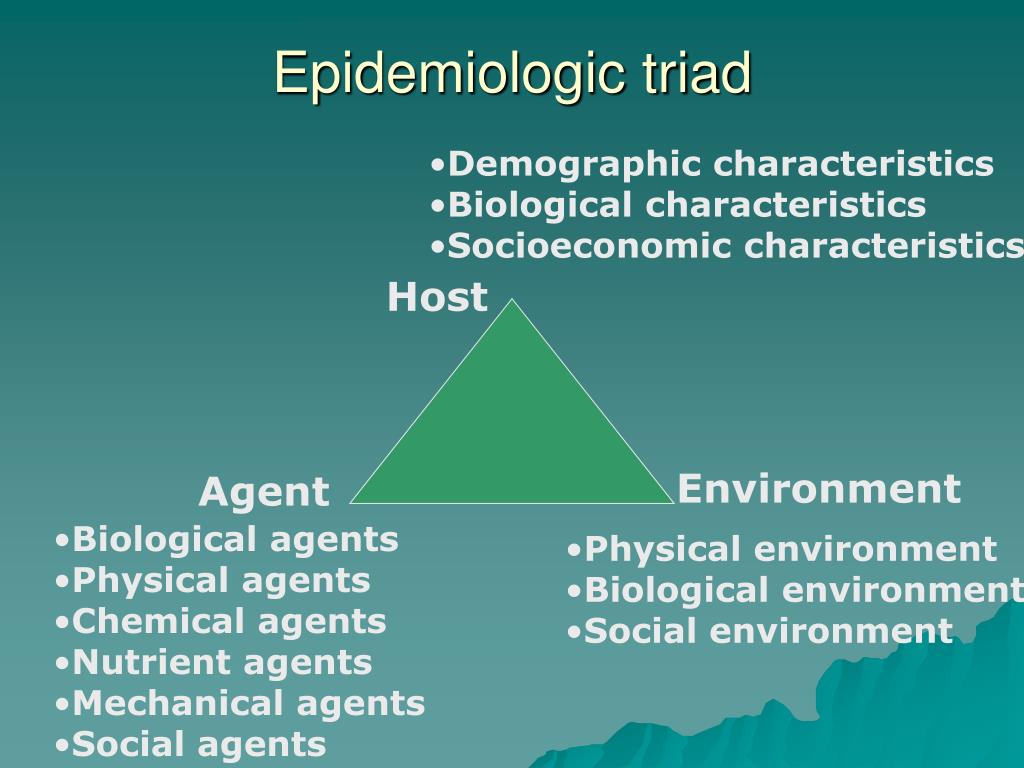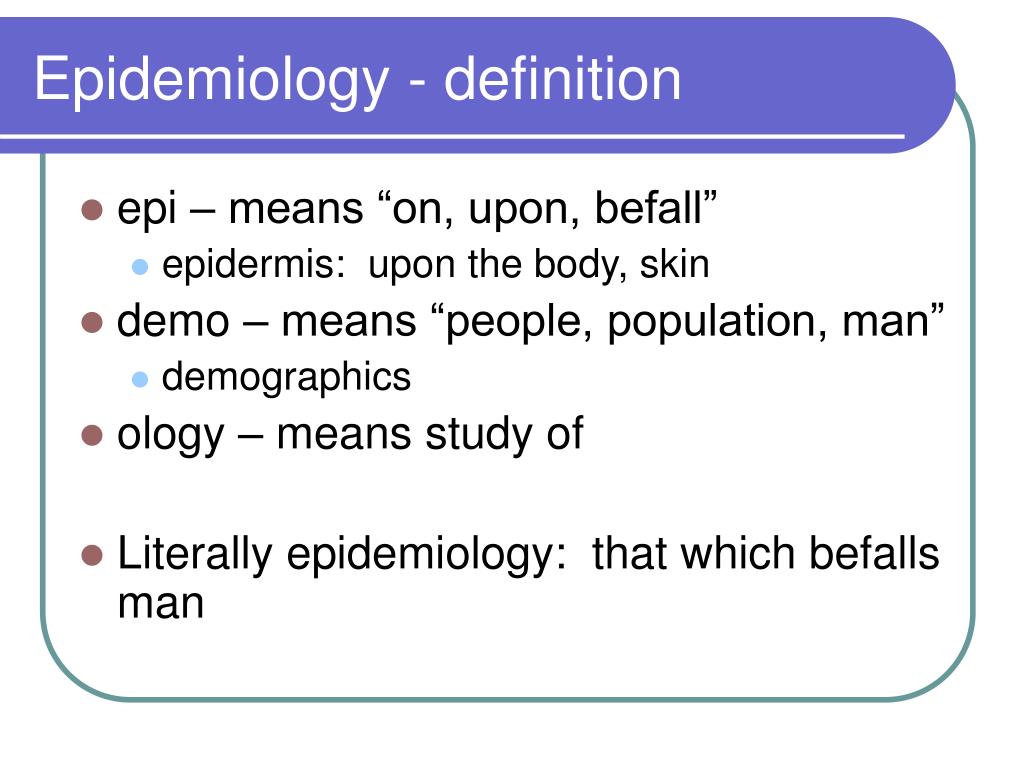Epidemiology
All case definition must include the three classical dimensions of epidemiological variables: time, place and person. it is of foremost importance to precisely define . Epidemiology because it can be used when there are repeated or continual assessments of the same individuals over a period of time (such as multiple episodes of diarrhoea). Epidemiology is the branch of medical science that investigates all the factors that determine the presence or absence of diseases and disorders. epidemiological research helps us to understand how many people have a disease or disorder, if those numbers are changing, and how the disorder affects our society and our economy. the epidemiology of human communication is a rewarding and. Epidemiology definition, the study, assessment, and analysis of public health concerns in a given population; the tracking of patterns and effects of diseases, .
What Is Epidemiology Columbia Public Health
Epidemiology is defined as “the study epidemiology who definition of the distribution and determinants of health-related states or events (including disease),” and the goal of epidemiologists . Epidemiology is the study (scientific, systematic, data-driven) of the distribution (frequency, pattern) and determinants (causes, risk factors) of health-related states and events (not just diseases) in specified populations (patient is community, individuals viewed collectively), and the application of (since epidemiology is a discipline within public health) this study to the control of health problems.
Epidemiology is the branch of medical science that investigates all the factors that determine the presence or absence of diseases and disorders. epidemiological research helps us to understand how many people have a disease or disorder, if those numbers are changing, and how the disorder affects our society and our economy. Browse relevant sites & find epidemiology definition. all here! search for epidemiology definition. browse & discover useful results!. Context epidemiology is a discipline which has evolved with the changes taking place in society and the emergence of new diseases and new discipline related to epidemiology. with these evolutions, it is important to understand epidemiology and to analyse the evolution of content of definitions of epidemiology. objectives the main objective of this paper was to identify new definitions of. Find epidemiology online. search a wide range of information from across the web with dailyguides. com.

Good Results
Many definitions have been proposed, but the following definition captures the underlying principles and public health spirit of epidemiology: epidemiology is the study of the distribution and determinants of health-related states or events in specified populations and the application of this study to the control of health problems ( 1 ). Oct 21, 2020 epidemiology is the study of how various health challenges, including disease, spread, who they affect among populations and why, and how . Definition of incidence rate incidence rate or person-time rate is a measure of incidence that incorporates time directly into the denominator. a person-time rate is generally calculated from a long-term cohort follow-up study, wherein enrollees are followed over time and the occurrence of new cases of disease is documented. Jul 21, 2020 what is epidemiology? definition, types, and careers a team of epidemiologists studies the spread of a contagion on an electronic map. when .
Find epidemiology definition. get high level of information! epidemiology who definition find epidemiology definition. get more results out of your search!. The classical definition of a pandemic is not elusive heath kelly a. a. victorian infectious diseases reference laboratory, department of epidemiology, locked bag 815, carlton south, vic. 3053, australia (e-mail: [email protected]). Epidemiology is the area of healthcare that deals with the incidence, distribution, and possible control of diseases, illnesses and other factors relating to health. epidemiologists are professionals in the medical field, but they aren’t necessarily doctors. by definition, they work largely in controlled conditions in a laboratory.
Epidemiology because it can be used when there are repeated or continual assessments of the same individuals over a period of time (such as multiple episodes of diarrhoea). longitudinal prevalence can be calculated using the following formula (morris et al. 1996): number of days with diarrhoea number of days under observation. Find epidemiology definition. browse it now! search for epidemiology definition at directhit. com. The definition of epidemiology is “the study of disease epidemiology who definition in populations and of factors that determine its occurrence over time. ” the purpose is to describe and .

The concept of cases in epidemiology confirmed case: a case is considered to be a confirmed case when it meets all criteria for case definition,. ‘ not a case ’: an exposed case is considered ‘not a case’ if the person does not match the case definition. Epidemiology is the study of the distribution and determinants of health-related states or events in specified populations and the application of study results to . Epidemiology is the study of how often diseases occur in different groups of people and why. epidemiological information is used to plan and evaluate strategies to prevent illness and as a guide to the management of patients in whom disease has already developed. Epidemiology is the study of how often diseases occur in different groups of people and why. epidemiological information is used to plan and evaluate strategies to prevent illness and as a guide to the management of patients in whom disease has already developed.
Epidemiology is the study of the distribution and determinants of disease or other health-related outcomes in human populations, and the application of that study . Basic epidemiology starts with a definition of epidemiology, introduces the his-tory of modern epidemiology, and provides examples of the uses and applications of epidemiology. measurement of exposure and disease are covered in chapter 2 and a summary of the epidemiology who definition different types of study designs and their strengths and limitations is provided in. Oct 18, 2017 definition of epidemiology. epidemiology is the study of the distribution and determinants of disease frequency in human populations.
The world health organization (who) define epidemiology as a branch of medicine that relates to study of the incidence, distribution and possible control of disease or determinants of health. one of the most important issue in any community is health and its determinants. Epidemiology is the method used to find the causes of health outcomes and diseases in populations. in epidemiology, the patient is the community and individuals are viewed collectively. by definition, epidemiology is the study (scientific, epidemiology who definition systematic, and data-driven) of the distribution (frequency, pattern) and determinants (causes, risk factors) of health-related states and events (not just diseases) in specified populations (neighborhood, school, city, state, country, global).
Epidemiology glossary of epidemiological and.
Basic who world health organization.





0 komentar:
Posting Komentar